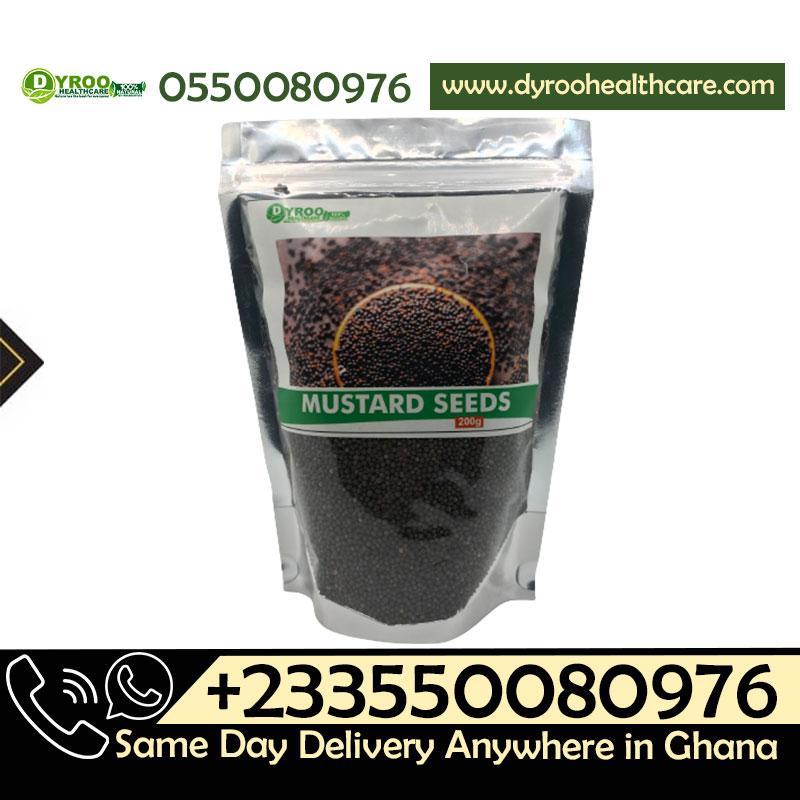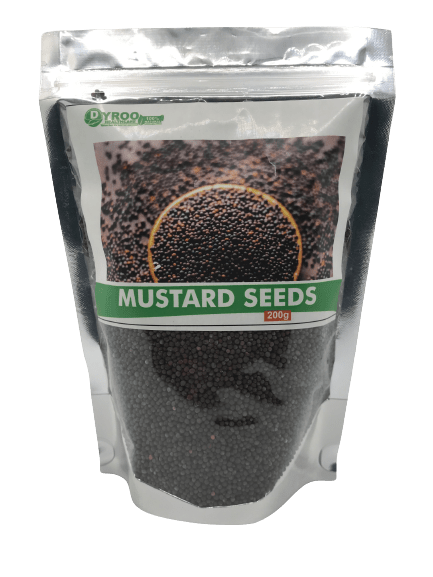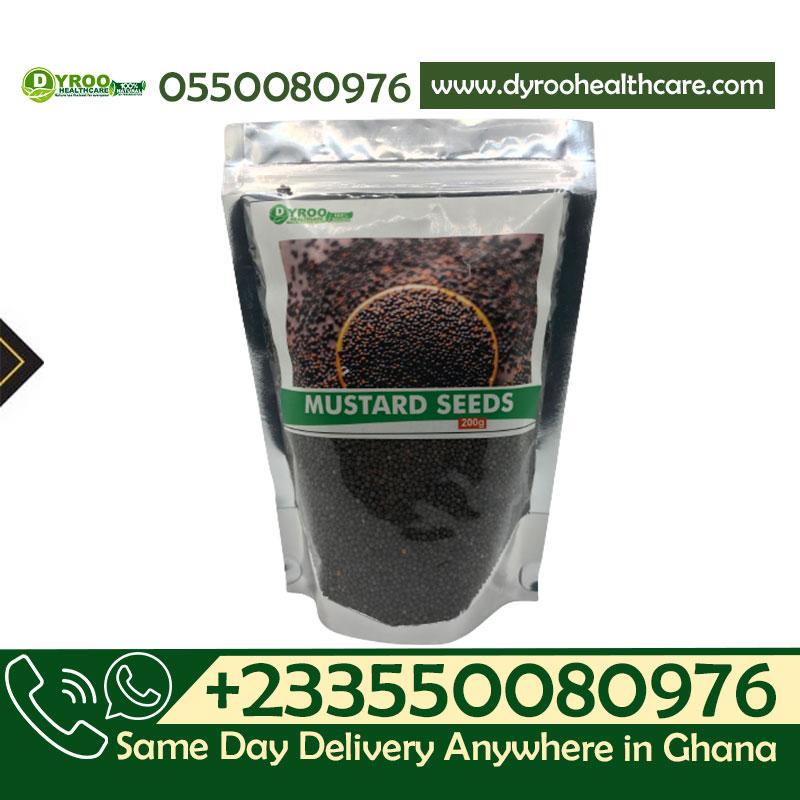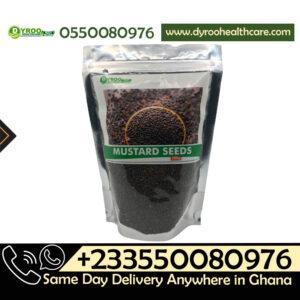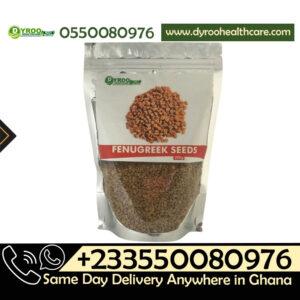Description
Mustard seeds are the small round seeds of various mustard plants. The seeds are usually about 1 to 2 millimetres in diameter and may be colored from yellowish white to black.
Mustard Seed Nutrition Facts
There are many varieties of mustard that are all very rich in nutrients. Mustard seeds in particular are rich in several minerals such as copper, calcium, iron, magnesium, phosphorus, potassium, sodium, zinc, manganese, and selenium.
Mustard seeds are also a good source of several vitamins, including vitamins C and K, thiamin, riboflavin, vitamin B6, and folic acid. They have a high percentage of dietary fiber and are a valuable source of several bioactive compounds such as antioxidants and polyunsaturated fatty acids.
A 20-gram portion of mustard seeds contains:
- Calories: 101.6 calories
- Fiber: 2.44 grams
- Protein: 5.22 grams
- Fat: 7.24 grams
- Vitamin C: 1.42 milligrams
- Vitamin K: 1.08 micrograms
- Thiamin: 0.16 milligrams
- Riboflavin: 0.05 milligrams
- Niacin: 0.95 milligrams
- Folate: 32.4 micrograms
- Calcium: 53.2 milligrams
- Iron: 1.84 milligrams
- Zinc: 1.22 milligrams
- Copper: 0.13 milligrams
- Magnesium: 74 milligrams
- Phosphorus: 165.6 milligrams
- Potassium: 147.6 milligrams
- Sodium: 2.6 milligrams
- Manganese: 0.49 milligrams
- Selenium: 41.6 micrograms
Health Benefits of Mustard
Mustard is typically served in small quantities due to its strong, pungent flavor.
Being a part of the cruciferous family, it’s rich in antioxidants and glucosinolates, a group of compounds that contain sulfur. There are also other chemicals such as isothiocyanates and sinigrin that are derived from glucosinolates and have specific health benefits.
May Be Effective as an Antimicrobial
One of the important ingredients of mustard seeds is sinigrin, which is responsible for its pungent taste. When mustard seeds are digested, it leads to the breakdown of sinigrin and the formation of a compound called allyl isothiocyanate (AITC). Research has shown that AITC has extensive antimicrobial properties that protect against a variety of bacterial strains.
Sinalbin, which is present in some species of mustard, is also derived from glucosinolate and breaks down into a type of isothiocyanate. It has been shown to have even more potent antimicrobial properties than sinigrin.
Some studies have also shown the potent effects of AITC on the inhibition of enzymes that are essential for the metabolic activities of bacteria. This leads to membrane damage in bacteria and reduces their harmful impact.
The severity of the antibacterial activity differs based on the type of mustard that the seeds are derived from, which dictates the number of glucosinolates present. All types of mustard seeds, though, exhibit considerable antimicrobial activity.
Possible Antioxidant Effects
Phenolic compounds that are widely present in mustard seeds are known for their antioxidant activity. These phenolic compounds react with free radicals in the body and inhibit their harmful effects. Mustard seeds also contain tocopherols, part of the family of E vitamins, that are fat-soluble compounds and have extensive antioxidant capabilities.
Research has also shown the antioxidant activity of sinigrin that helps reduce the production of nitric oxide, the chemical that is widely attributed to the formation of free radicals in the human body.
May Have Anticancer Activity
Compounds that contain reactive nitrogen groups have also been linked to carcinogenic processes. Research has shown that sinigrin causes cancer cell death, although the exact mechanism of the anticancer activity of the glucosinolate derivative is still unclear.
It’s hypothesized that the inhibitory effect of sinigrin is due to its modifying effect on certain enzymes that lower the risk of DNA damage to the tissues that are targeted by cancer-causing agents. Although this research is promising, further studies are needed to determine the exact mechanisms of its anticancer effects.
May Enhance Healing Activity
Research has found that sinigrin enhances wound healing abilities when used in combination with lipid-based phytosomes. Phytosomes are lipid (fat) molecules that help enhance the impact of herb-based chemicals (such as sinigrin) by enhancing their absorption.
Could Protect Against Specific Health Conditions
Recent research has shown that mustard seeds could help with specific health conditions.
Lower blood sugar levels. A study in the Philippines showed that the intake of mustard seed extracts, along with blood sugar medication, may help lower blood sugar levels in people with type 2 diabetes. The effect of the medicines was more pronounced when they were taken along with the mustard extract.
NB: Mustard Seeds are natural and can be used for purposes that are listed here, seeds and nuts usage is knowledge based
Click here to know 7 benefits and uses of Mustard Seed, backed by science.
Where to Buy Mustard Seeds in Ghana?
Searching for where to buy Mustard Seeds in Ghana? Want to know Price of Mustard Seeds in Ghana? Order Mustard Seeds from www.dyroohealthcare.com | www.dyroorganics.com. Simply contact us on 0550080976 | 0241155551 – Whatsapp +233550080976 for your supplements. We do same day delivery anywhere in Ghana.
Click Here to Directly Send Us A Whatsapp Message
TO BUY ORGANIC WHOLEFOODS, PLEASE CALL NOW!!!
CUSTOMER CARE (+233) 0550080976 | (+233) 0241155551

